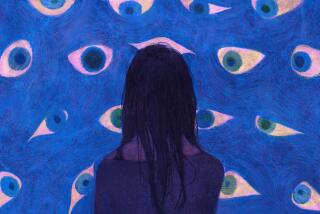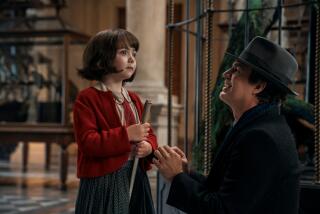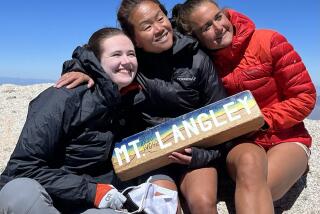Inner Vision : Her Outlook, Determination Led to Happiness
- Share via
Ann Marie Sullivan, principal of La Monte Academie in Laguna Niguel, is chatting with a student in her office.
The conversation is animated, warm. Sullivan asks for a description of the formal gown the girl wore to a recent senior prom. “Will we be able to see the pictures?” she asks.
Neither acknowledges the fact that Sullivan won’t ever be able to see the photographs. She has been blind since birth.
Sullivan, 47, has been principal of La Monte--a small, private school for gifted and learning-disabled children in kindergarten through 12th grade--for two years. She’s also working toward a doctorate in clinical psychology through the Santa Barbara-based Fielding Institute, and she’s the mother of a 2-year-old child she’s raising on her own.
Sullivan doesn’t seem to think that her blindness is any big deal. “In order to be a well-functioning person I need to acknowledge I’m blind, but I don’t feel different from anybody else,” she says. “I describe myself as a blind person without an excuse: I don’t use being blind as a reason for not being a whole person.”
In her interactions with the La Monte staff, Sullivan seems energetic and even-tempered, quick with a quip or a compliment. “Ann has made me feel good about myself, going to work after 40 years,” said Genevieve Jamison (Jammie) Tiberi, an instructional aide who helps Sullivan organize students’ records. “She’s fun to work with,” Tiberi said. “She’s not only my boss, but she’s become a close friend.”
Four years ago Sister Paula Jane Tupa, the school’s founder and director, heard about Sullivan, who has a master’s degree in psychology but was eking out a living in Long Beach doing office work and phone sales. Tupa called her up.
“Over the phone I could tell right away this was someone I needed,” Tupa said. “I didn’t even know she was blind.” A friend drove Sullivan to Laguna Niguel for the job interview, which lasted only a few minutes. Tupa said she had no hesitation about hiring a secretary who couldn’t see: “She has so much else to offer--and she doesn’t feel sorry for herself.”
After two years, Tupa promoted Sullivan from secretary to principal. “This is the first year she’s (completely) on her own, and there’s no problem,” Tupa said. “This frees me up to spend my energies on where the corporation needs to go. Because she’s a trained psychologist, she can do for the kids what I can’t. A lot of times there are lines around the corner of kids waiting just to talk to her.
“I think because she’s blind, there are some inner workings there the rest of us are not gifted with,” Tupa said. “It’s incredible, it’s almost weird, how she understands people.
“Children are often afraid of people who are not sighted. Once they get to know her, there’s no problem. She knows you by your walk. Once a student tried to sneak in late, through the front, and she said ‘John!’ He stopped in his tracks, he was so astonished she could know he was there.”
Sullivan is tall, very thin, with dark brown hair. She smiles a lot. She has dark blue eyes, which, she says, are just “a shell” covering her eye sockets. She’s been blind since birth; her natural eyes were removed long ago to prevent glaucoma.
In May she acquired new hand-painted plastic eyes, made possible by donations from the Laguna Niguel and Mission Viejo Lions clubs. Sullivan was introduced to those groups by Marla Gitterman, a Laguna Niguel resident who has organized 15 volunteers to make tape recordings of Sullivan’s psychology textbooks, which aren’t available in Braille.
Sullivan lives with Mary Therese (Thesie) Kissel, a longtime, legally blind friend trained in carpentry and electrical and plumbing repair. Kissel, who is presently out of work, assists Sullivan with some day-to-day tasks. But Sullivan is determined not to be dependent on other people. “I live in a visual society, but I do not want to live in a blind world,” she said. “Vision means more than just seeing.”
Sullivan uses a cane when navigating new territory, but not at home or on the job. “When I don’t need a symbol of being blind, I can put it away,” she said. “If I had a (guide) dog, the symbol would always be with me.” She gets to and from work by Dial-A-Ride bus, and her daughter, Heather, attends a preschool near La Monte.
At home, Sullivan spends as much time as she can with Heather, a curly-haired, playful bundle of energy. Heather is sighted.
Whenever her daughter came near her during a recent conversation, Sullivan lit up. Heather cuddled up to her mom, giving her children’s books to read aloud, sometimes guiding Sullivan’s fingers over the Braille inscriptions she has added to several books.
Many people have made false assumptions about her ability to take care of Heather, Sullivan said. “When I brought her home, the doctor made me sign a paper saying I would have a visiting nurse come and see her. The visiting nurse never showed up. It’s a good thing I didn’t need her!” Sullivan laughed.
“When she was a little baby, people walked up to me and said, ‘You don’t deserve to have a child,’ ” Sullivan said. Such incidents don’t happen anymore. She added: “I think people see she looks so healthy, so free, and they think, ‘Oh, it’s fine.’ ”
Yet, Sullivan said, some comments still bother her. Once she took Heather to a medical clinic to be treated for an ear infection, and a woman said to the child: “Someday, little one, you’re gonna be momma’s eyes,” Sullivan recalled.
“My thought about that was, someday that kind of talk is going to make Heather so angry, because we don’t live like that. I don’t feel someday Heather’s going to be my eyes,” Sullivan said. “I have vision. It’s just that I can’t see.”
Sullivan was born on Staten Island, N.Y., one of nine children. Her blindness resulted from her premature birth. She describes her childhood as “pretty average. I did all the things my brothers and sisters did.
“I loved the New York subways. I saw almost everything the city could offer me,” she said. “I had such good friends. I was probably the only blind student at the Catholic high school I attended.”
After two years of college, at age 20, she entered a Benedictine convent in Philadelphia. She was a Benedictine nun for 15 years, five of them as mother superior of the community.
Kissel entered the convent eight years before Sullivan left. Both women departed in 1978 because the overall Benedictine administration had become conservative and was discouraging nuns from being socially active outside their community, Sullivan said. While making her decision to leave, “strangely enough, I was reading ‘Zorba the Greek,’ ” she recalled. “I thought, there’s just too much of the Zorba in me, too much of the dance. I had to move on.”
Sullivan briefly joined another order, then enrolled at Villa Maria College in Erie, Pa. She graduated summa cum laude, then earned a master’s degree in psychology from the Illinois School of Professional Psychology in Chicago. The blustery Midwest winters made her decide, five years ago, to come to California. (Kissel, with whom she’d stayed in touch after leaving the convent, came to California separately.)
Meanwhile, her romance with Robert Sullivan, whom she’d met in Chicago, was rocky. Robert, who is legally blind, visited her in California, but they canceled their wedding plans. Then Robert went back to Illinois, and Ann Marie discovered she was pregnant.
“When I found out I was pregnant, my first reaction was, ‘Don’t tell him,’ ” Sullivan said. She did, however, and Robert returned to California. “He seemed so settled, and he seemed like the Robert I knew, that I fell in love with,” she said. The two were married, and Robert began attending a Claremont seminary. The marriage lasted only one year.
“He went back to Chicago. He just couldn’t cope out here,” Sullivan said. “Robert wanted Heather with all his heart, but he just couldn’t deal with being a husband and father.”
But Sullivan was delighted to become a mother. “I love kids, I think I would be classified as a kid person,” she said. “I had Heather when I was 44. And that was so neat, that was very special for me. I felt like God was saying to me, ‘The years you gave to me weren’t lost,’ ” Sullivan says.
Still, Sullivan admits, raising Heather alone is difficult. She likes the work at La Monte, but her salary is small. Covering living expenses and paying tuition for graduate school stretch her finances very thin. She receives a small amount of federal assistance for Heather through Robert’s social security income, but she’s saving that money for emergencies.
So Sullivan and Kissel have started a mail-order business. Once Sullivan earns her doctoral degree, four or five years from now, she hopes to establish a private counseling practice. She doesn’t think her blindness will affect her ability to be a good therapist.
On several occasions, however, being unable to see has made Sullivan vulnerable to attack. In her adult life she’s been assaulted three times, she said, but she managed to escape her attackers.
“People see you out on the street with a cane, and think you’re more vulnerable,” Sullivan said. Yet, “I think it wouldn’t be good for me to take the attitude I should not trust people. I think you just say, well, those kinds of things happen.
“I’ve made a basic choice in my life to be happy. It’s not like that’s ready-made and you ever know how to do it, but that’s my strong inner goal. I take responsibility for my own inner happiness. I don’t sit down and say, ‘Poor me.’ I say, ‘What can I do to make the situation better?’ ”


